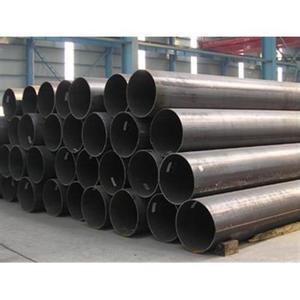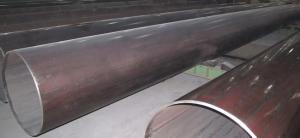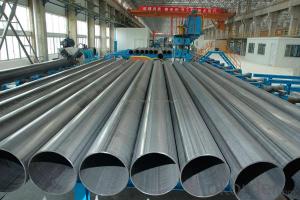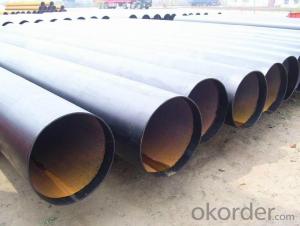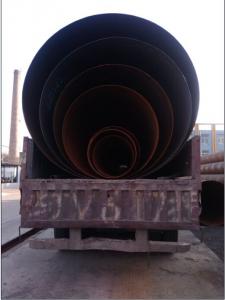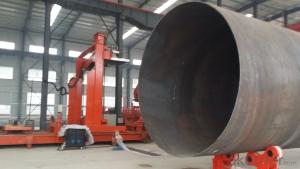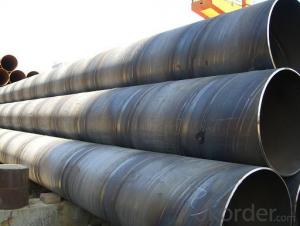56''-64'' CARBON STEEL LSAW WELDED PIPE API/ASTM/JIS/DIN
- Loading Port:
- Tianjin
- Payment Terms:
- TT OR LC
- Min Order Qty:
- 5 m.t
- Supply Capability:
- 300 m.t/month
OKorder Service Pledge
OKorder Financial Service
You Might Also Like
Packaging & Delivery
Packaging Detail: | standard export packing or as customer's requirement |
Delivery Detail: | within 10 - 30 days |
Specifications
Spiral Welded Steel Pipes and Tubes
1.Material:Q195-Q235
2.Length:1-12m
3.WT:1.0-14mm
4.O.D.:20-273mm
Product Description:
1.Material : Q235,Q345,L245,L290,L360,L415,L450,L485,GrB,X42,46,X52,X56,X60,X65,X70,X80,X100
2,Standard: SY/T5037-2000,GB/T9711-2011,API Spec 5L PSL1/PSL2,ASTM A252\A53,ISO3183,DIN17172,EN10217,JIS G3457,AWWA C200,ASTM A139,ASTM A671,ASTM A672
3.Wall thickness: 3.0mm-30mm
4.Outer diameter: φ168mm-3020mm
5,Length: 5m-12m or as your requirement
6,Corrosion protection standard: DIN30670,DIN30671, AWWAC210, AWWA C203, SY/T0413-2002,SY/T0414-2002
7,Application: Oil, gas, natural gas, water pipe, thermal electricity pipe, steel structure engineering, etc
Q195-q345 Material Steel Pipe's Materials
Elements | Chemical Compsition% | Mechanical Property | ||||||
C% | Mn% | S% | P% | Si% | Yield Point (Mpa) | Tensile Strength(Mpa) | Elongation | |
Q195 | 0.06-0.12 | 0.25-0.50 | <0.050< span=""> | <0.045< span=""> | <0.030< span=""> | >195 | 315-430 | 32-33 |
Q215 | 0.09-0.15 | 0.25-0.55 | <0.05< span=""> | <0.045< span=""> | <0.030< span=""> | >215 | 335-450 | 26-31 |
Q235 | 0.12-0.20 | 0.30-0.70 | <0.045< span=""> | <0.045< span=""> | <0.030< span=""> | >235 | 375-500 | 24-26 |
Q345 | <0.20< span=""> | 1.0-1.6 | <0.040< span=""> | <0.040< span=""> | <0.55< span=""> | >345 | 470-630 | 21-22 |
Packaging & Delivery
Packaging Detail: | Normal exporting packing,in container or bulk vessel or as per clients' request |
Delivery Detail: | 2 months after confimed contract |
Specifications
Large Diameter API 5L X70 PSL2 LSAW Steel Pipe
Grade: X42, X46, X50, X52, X60, B, C
OD: 1.5"-28"
WT: SCH10-SCH160
Brand:TPCO
Large Diameter API 5L X70 PSL2 LSAW Steel Pipe
Specifications:
u Standard: API 5L
u Grade: B, C, X42, X46, X50, X52, X56, X60, X65, X70, X80
u OD: 1.5"-28"
u WT: SCH10-SCH160
u Length: 5-12m
u Ends Finish: plain end, bevel end, grooved end
u Surface Treatment: bare, black varnished, oiled finish, red color, anti-corrosion, 3PE, FBE or epoxy coating
u Technique: hot rolled or cold drawn
u Application: api 5l steel pipe for conveying oil, water, gas
u Invoicing: based on theoretical weight or actual weight
u Payment Terms: L/C at sight, T/T or Western Union
u Trade Terms: FOB, CFR, CIF
u Certification: ABS manufacturing assessment, ABS design assessment, API 5CT, API 5L, DNV manufacturer certificate, ISO9001 quality management system certificate, ISO14001 environment management system certificate, GB/T28001 occupational health and safety management system certificate, A1 class manufacturing license of special equipment certificate, CCS, GL, LR, SGS, TüV, PDE
- Q: Can steel pipes be used for transporting liquids?
- Yes, steel pipes can be used for transporting liquids. Steel pipes offer excellent strength, durability, and resistance to corrosion, making them suitable for various applications, including the transportation of liquids such as water, oil, and gas.
- Q: How are steel pipes protected against external impact or mechanical damage?
- Steel pipes are protected against external impact or mechanical damage through various methods. One commonly used technique is the application of a protective coating on the surface of the pipe. This coating acts as a barrier and helps to prevent direct contact between the pipe and any external objects or forces. Coatings such as epoxy, polyethylene, or polyurethane are often used as they provide excellent resistance to impact and abrasion. Another method of protection is the use of pipe supports or clamps. These supports are installed at regular intervals along the length of the pipe to provide stability and prevent excessive movement or vibration. They help distribute the load and absorb any external impacts, reducing the risk of mechanical damage. In addition, steel pipes can be reinforced by wrapping them with materials such as fiberglass, carbon fiber, or kevlar. These reinforcement materials add an extra layer of strength and durability, making the pipes more resistant to external impact and mechanical damage. Furthermore, measures such as burying the pipes underground or installing them within protective casings can also provide an additional layer of protection. This helps shield the pipes from direct contact with external objects, reducing the risk of damage from accidental impacts or environmental factors. Overall, a combination of protective coatings, supports, reinforcements, and proper installation methods help ensure that steel pipes are safeguarded against external impact or mechanical damage, thereby prolonging their lifespan and maintaining their structural integrity.
- Q: What are the different types of steel pipe couplings?
- In the market, there exists a variety of steel pipe couplings to cater to specific applications and needs. The following are some of the commonly used types: 1. Threaded Coupling: This coupling is equipped with threaded ends for easy installation and removal. It is suitable for low-pressure applications and can be used with both threaded and non-threaded pipes. 2. Compression Coupling: Designed to create a secure and leak-proof connection between two pipes, compression couplings consist of two pieces that are tightened together using compression nuts or sleeves, thus forming a tight seal. 3. Slip-On Coupling: A slip-on coupling is a simple and convenient option that can be easily installed by sliding it onto the pipe ends and then securing it in place through welding or bolting. It is commonly used to join pipes with plain ends and is suitable for both high and low-pressure applications. 4. Grooved Coupling: Grooved couplings possess a groove on both pipe ends, allowing them to be connected by using a rubber gasket and coupling housing. This type of coupling ensures a reliable and flexible connection that can accommodate minor misalignments and vibrations. 5. Flanged Coupling: Consisting of two flanges bolted together with a gasket in between, flanged couplings are widely used in high-pressure applications due to their strength and reliability. 6. Welded Coupling: Welded couplings are permanently joined to the pipe ends through a welding process. This type of coupling guarantees a strong and durable connection that is resistant to leaks and vibrations. These examples represent only a fraction of the steel pipe couplings available. The choice of coupling depends on factors such as the pipe type, application requirements, and the desired level of strength and flexibility. It is crucial to select the appropriate coupling to ensure a secure and dependable connection between pipes.
- Q: How are steel pipes protected from corrosion?
- Steel pipes are protected from corrosion through various methods such as applying protective coatings, galvanizing the pipes, or using corrosion inhibitors.
- Q: How do you calculate the pipe pressure drop coefficient for steel pipes?
- To calculate the pipe pressure drop coefficient for steel pipes, you can use the Darcy-Weisbach equation, which takes into account factors such as the pipe length, diameter, roughness, and fluid flow rate. The coefficient can be determined using empirical correlations or charts based on these parameters, ensuring accurate estimation of pressure drop in steel pipes.
- Q: Can steel pipes be used for offshore applications?
- Yes, steel pipes can be used for offshore applications. Steel pipes are commonly used in offshore industries due to their durability, strength, and resistance to corrosion. Offshore applications such as oil and gas exploration, drilling, production, and transportation of fluids and gases often require the use of steel pipes. These pipes are designed to withstand harsh and corrosive environments found in offshore locations, including exposure to saltwater, extreme temperatures, and high pressure. Additionally, steel pipes can be manufactured to meet specific requirements for offshore projects, including size, thickness, and material grade, to ensure safety and reliability. Overall, steel pipes are a reliable and widely used choice for offshore applications.
- Q: What are the different sizes available for steel pipes?
- Steel pipes are available in a wide range of sizes, ranging from small diameters as small as 1/8 inch to larger diameters exceeding 72 inches. The sizes of steel pipes are typically measured based on their outside diameter (OD) and wall thickness, with various standard sizes available to meet different application requirements.
- Q: Can steel pipes be used for underground drainage systems?
- Yes, steel pipes can be used for underground drainage systems.
- Q: What are the safety precautions when working with steel pipes?
- When working with steel pipes, it is important to follow certain safety precautions to prevent accidents and injuries. Some key safety measures include wearing appropriate personal protective equipment (PPE) such as gloves, safety goggles, and steel-toed boots to protect against cuts, burns, and impacts. Additionally, workers should be trained on proper handling and lifting techniques to avoid strains and sprains. It is crucial to inspect the pipes for any defects or damage before use and ensure they are properly secured to prevent them from falling or rolling. Finally, maintaining a clean and organized work area, using caution signs, and following proper procedures for cutting, welding, and handling flammable materials are essential for a safe working environment.
- Q: What are the different methods of pipe joining using steel pipes?
- There are several methods of pipe joining using steel pipes, each with its own advantages and disadvantages. 1. Threaded and coupled: This method involves threading the ends of the steel pipes and using couplings to connect them. It is a simple and cost-effective method, but it is not suitable for high-pressure or gas applications. 2. Welding: Welding is a popular method for joining steel pipes. It involves heating the ends of the pipes and fusing them together using a welding process. This method creates a strong and leak-proof joint, but it requires skilled labor and can be time-consuming. 3. Grooved: In this method, the ends of the steel pipes are grooved and then connected using mechanical couplings or fittings. It is a quick and reliable method, suitable for both high-pressure and low-pressure applications. However, it requires specialized tools and equipment. 4. Flanged: Flanged joints involve connecting steel pipes using flanges, which are flat discs with bolt holes. The pipes are aligned and bolted together using gaskets to create a secure connection. This method is commonly used for large-diameter pipes and high-pressure applications, but it can be expensive and time-consuming to install. 5. Compression: Compression fittings are used to join steel pipes by compressing a ferrule or sleeve against the pipe. This method is quick, easy, and requires no special tools. However, it is not suitable for high-pressure or high-temperature applications. 6. Brazing: Brazing involves heating the ends of the steel pipes and melting a filler material between them to form a joint. It is a reliable method for joining pipes in HVAC and refrigeration systems, but it requires skilled labor and careful temperature control. It is important to consider the specific requirements of the application, such as pressure, temperature, and material compatibility, when selecting the appropriate method of pipe joining using steel pipes.
Send your message to us
56''-64'' CARBON STEEL LSAW WELDED PIPE API/ASTM/JIS/DIN
- Loading Port:
- Tianjin
- Payment Terms:
- TT OR LC
- Min Order Qty:
- 5 m.t
- Supply Capability:
- 300 m.t/month
OKorder Service Pledge
OKorder Financial Service
Similar products
Hot products
Hot Searches
Related keywords
